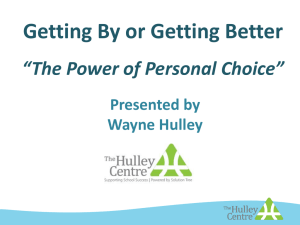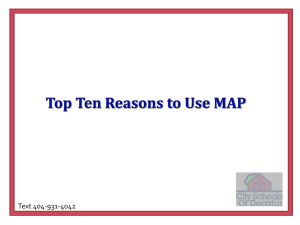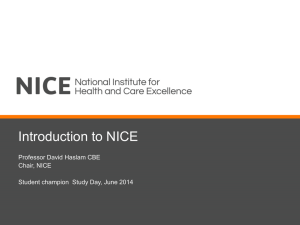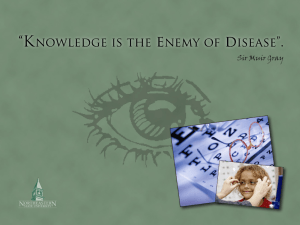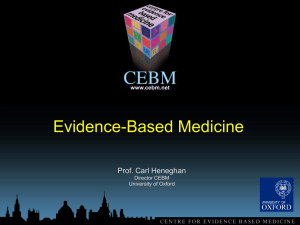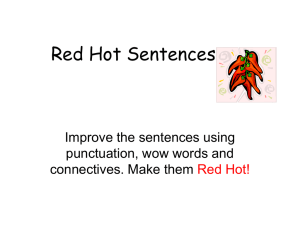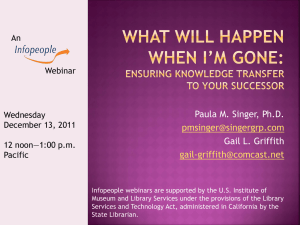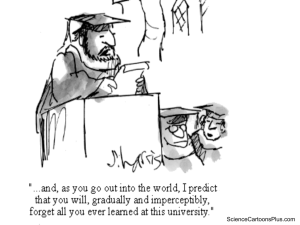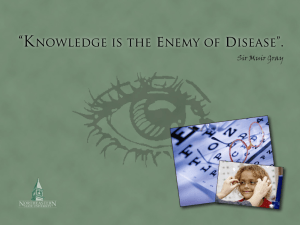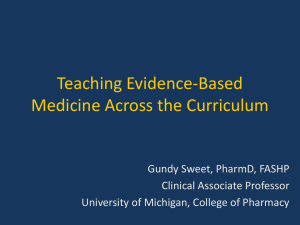Peer teaching of evidence based medicine to undergraduate
advertisement
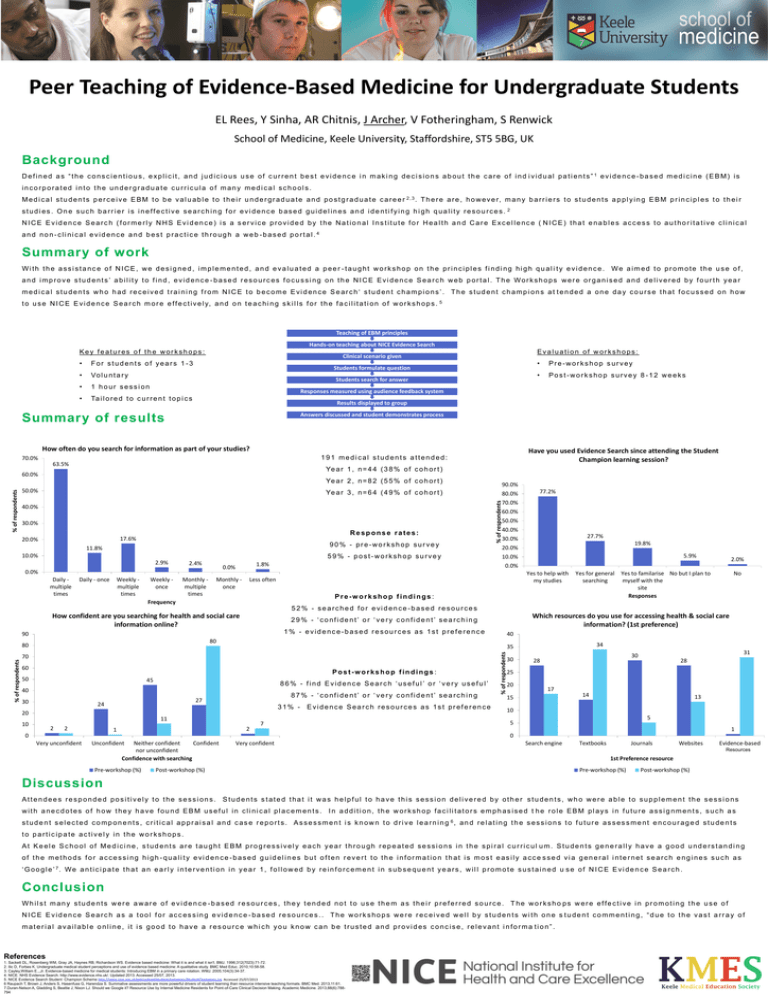
Peer Teaching of Evidence-Based Medicine for Undergraduate Students EL Rees, Y Sinha, AR Chitnis, J Archer, V Fotheringham, S Renwick School of Medicine, Keele University, Staffordshire, ST5 5BG, UK Background Defined as “the conscientious, explicit, and judicious use of current best evidence in making decisions about the care of ind ividual patients”1 evidence-based medicine (EBM) is incorporated into the undergraduate curricula of many medical schools. M e d i c a l s t u d e n t s p e r c e i v e E B M t o b e v a l u a b l e t o t h e i r u n d e r g r a d u a t e a n d p o s t g r a d u a t e c a r e e r 2 , 3 . T h e r e a r e , h o w e v e r, m a n y b a r r i e r s t o s t u d e n t s a p p l y i n g E B M p r i n c i p l e s t o t h e i r studies. One such barrier is ineffective searching for evidence based guidelines and identifying high quality resources. 2 NICE Evidence Search (formerly NHS Evidence) is a service provided by the National Institute for Health and Care Excellence ( NICE) that enables access to authoritative clinical and non-clinical evidence and best practice through a web -based portal.4 Summary of work With the assistance of NICE, we designed, implemented, and evaluated a peer -taught workshop on the principles finding high quali ty evidence. We aimed to promote the use of, and improve students’ ability to find, evidence -based resources focussing on the NICE Evidence Search web portal. The Workshops were organised and delivered by fourth year medical students who had received training from NICE to become Evidence Search‘ student champions’. The student champions at tended a one day course that focussed on how t o u s e N I C E E v i d e n c e S e a r c h m o r e e f f e c t i v e l y, a n d o n t e a c h i n g s k i l l s f o r t h e f a c i l i t a t i o n o f w o r k s h o p s . 5 Teaching of EBM principles Hands-on teaching about NICE Evidence Search Key features of the workshops: • For students of years 1-3 • Vo l u n t a r y • 1 hour session • Ta i l o r e d t o c u r r e n t t o p i c s Evaluation of workshops: Clinical scenario given Students formulate question Students search for answer Pre-workshop survey • Post-workshop survey 8-12 weeks Responses measured using audience feedback system Results displayed to group Answers discussed and student demonstrates process Summary of results How often do you search for information as part of your studies? Have you used Evidence Search since attending the Student Champion learning session? 191 medical students attended: 70.0% 63.5% Ye a r 1 , n = 4 4 ( 3 8 % o f c o h o r t ) 60.0% Ye a r 2 , n = 8 2 ( 5 5 % o f c o h o r t ) 50.0% Ye a r 3 , n = 6 4 ( 4 9 % o f c o h o r t ) 90.0% 80.0% 77.2% 70.0% 40.0% % of respondents % of respondents • 60.0% 50.0% 30.0% Response rates: 17.6% 20.0% 90% - pre-workshop survey 11.8% 10.0% 59% - post-workshop survey 2.9% 2.4% 0.0% Daily multiple times Daily - once Weekly multiple times Weekly once Monthly multiple times 1.8% 0.0% Monthly once 40.0% 27.7% 30.0% 19.8% 20.0% 5.9% 10.0% 0.0% Yes to help with my studies Less often Yes for general searching Pre-workshop findings: Frequency 2.0% Yes to familarise No but I plan to myself with the site Responses No 52% - searched for evidence-based resources How confident are you searching for health and social care information online? 1% - evidence-based resources as 1st preference 90 80 40 70 30 60 Post-workshop findings: 50 45 86% - find Evidence Search ‘useful’ or ‘very useful’ 40 30 87% - ‘confident’ or ‘very confident’ searching 27 24 31% - Evidence Search resources as 1st preference 20 11 10 2 2 0 Very unconfident 2 1 34 35 % of respondents % of respondents 80 Which resources do you use for accessing health & social care information? (1st preference) 29% - ‘confident’ or ‘very confident’ searching 7 31 30 28 28 25 20 17 15 14 13 10 5 5 1 0 Unconfident Neither confident Confident nor unconfident Confidence with searching Pre-workshop (%) Very confident Search engine Post-workshop (%) Textbooks Journals Websites Evidence-based Resources guidelines 1st Preference resource Pre-workshop (%) Post-workshop (%) Discussion Attendees responded positively to the sessions. Students stated that it was helpful to have this session delivered by other students, who were able to supplement the sessions with anecdotes of how they have found EBM useful in clinical placements. In addition, the workshop facilitators emphasised t he role EBM plays in future assignments, such as s t u d e n t s e l e c t e d c o m p o n e n t s , c r i t i c a l a p p r a i s a l a n d c a s e r e p o r t s . A s s e s s m e n t i s k n o w n t o d r i v e l e a r n i n g 6, a n d r e l a t i n g t h e s e s s i o n s t o f u t u r e a s s e s s m e n t e n c o u r a g e d s t u d e n t s to participate actively in the workshops. At Keele School of Medicine, students are taught EBM progressively each year through repeated sessions in the spiral curricul um. Students generally have a good understanding of the methods for accessing high -quality evidence-based guidelines but often revert to the information that is most easily acce ssed via general internet search engines such as ‘ G o o g l e ’ 7. We a n t i c i p a t e t h a t a n e a r l y i n t e r v e n t i o n i n y e a r 1 , f o l l o w e d b y r e i n f o r c e m e n t i n s u b s e q u e n t y e a r s , w i l l p r o m o t e s u s t a i n e d u s e o f N I C E E v i d e n c e S e a r c h . Conclusion Whilst many students were aware of evidence -based resources, they tended not to use them as their preferred source. The worksho ps were effective in promoting the use of NICE Evidence Search as a tool for accessing evidence -based resources.. The workshops were received well by students with one s tudent commenting, “due to the vast array of material available online, it is good to have a resource which you know can be trusted and provides concise, relevant informa tion”. References 1. Sackett DL, Rosenberg WM, Gray JA, Haynes RB, Richardson WS. Evidence based medicine: What it is and what it isn't. BMJ. 1996;312(7023):71-72. 2. Ilic D, Forbes K. Undergraduate medical student perceptions and use of evidence based medicine: A qualitative study. BMC Med Educ. 2010;10:58-58. 3. Cayley,William E.,,Jr. Evidence-based medicine for medical students: Introducing EBM in a primary care rotation. WMJ. 2005;104(3):34-37. 4. NICE. NHS Evidence Search. http://www.evidence.nhs.uk/. Updated 2013. Accessed 25/07, 2013. 5. NICE Evidence Search Student Champion Scheme http://www.nice.org.uk/getinvolved/studentchampions/StudentChampions.jsp Accessed 25/07/2013 6 Raupach T, Brown J, Anders S, Hasenfuss G, Harendza S. Summative assessments are more powerful drivers of student learning than resource intensive teaching formats. BMC Med. 2013;11:61. 7.Duran-Nelson A, Gladding S, Beattie J, Nixon LJ. Should we Google it? Resource Use by Internal Medicine Residents for Point-of-Care Clinical Decision Making. Academic Medicine. 2013;88(6):788794 KMES Keele Medical Education Society

